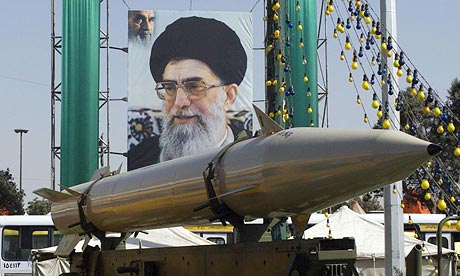
The urgency of dealing with the Iranian nuclear threat was underscored today when a leaked report revealed that the UN inspection agency believes the Islamic republic has "sufficient information" to make a nuclear weapon and has "probably tested" a key component.
A day after Barack Obama scrapped plans to deploy missile defence technology in eastern Europe, the Associated Press said it had obtained material from the International Atomic Energy Agency (IAEA) which suggests that it was more convinced Iran had been trying to make a bomb than its outgoing director, Mohamed ElBaradei, had admitted.
"The agency … assesses that Iran has sufficient information to be able to design and produce a workable implosion nuclear device based on HEU [highly enriched uranium] as the fission fuel," AP quoted a "secret annexe" to a report on Iran as saying. Western diplomats confirmed that the annexe was authentic.
"Its absolutely accurate," one official said. "It shows the agency's thinking, which is that Iran is a lot further along on this than most people think. It suggests the Iranians have done a lot of work."
The annexe said Iranian scientists had engaged in "probable testing" of explosives arranged in a hemisphere, which is how an implosion-type nuclear warhead is triggered.
There was also evidence, the report says, that Iran had worked on developing a chamber to carry a warhead on top of one of its missiles "that is quite likely to be nuclear".
Attention will now focus on the United Nations in New York next week, where Obama takes the rare step of chairing a security council session in order to generate momentum towards nuclear disarmament, non-proliferation and consensus over Iran.
His decision to change tack on missile defence has raised the prospect of improved co-operation with Russia in the security council. The Russian prime minister, Vladimir Putin, has praised Obama's U-turn as "correct and bold".
In a second overture to the Russians today, the Nato military alliance proposed a joint missile defence system to counter the danger of rocket attacks from countries like Iran.
"Our nations, and our forces deployed in theatre, will all become increasingly vulnerable to missile attacks by third parties," said Nato's new secretary general, Anders Fogh Rasmussen, in a speech made in Brussels.
"We should explore the potential for linking the US, Nato and Russia missile defence systems at an appropriate time … Both Nato and Russia have a wealth of experience in missile defence. We should now work to combine this experience to our mutual benefit."
Along with China, Russia has hitherto proved reluctant to support calls from the US and its western allies to deter Iran from pursuing nuclear weapons through heavier sanctions.
Moscow has indicated that it will not necessarily reverse its course as a result of the US climbdown on missile defence, but it equally has no interest in another nuclear power emerging on its southern fringe.
The IAEA annexe, entitled Possible Military Dimension of Iran's Nuclear Program, gives details of a top-level meeting in 1984 in which Ayatollah Ali Khamenei, then president and now supreme leader, appears to give the green light for building a bomb, saying: "A nuclear arsenal would serve Iran as a deterrent in the hands of God's soldiers."
Intelligence agencies in the US, Britain, France and Germany all believe that Iran has worked on developing a nuclear warhead, but they differ on how long that work went on and whether it is still continuing.
A US national intelligence estimate two years ago said that development work on a warhead ended in 2003, although British officials have questioned this assessment. The AP report does not make it clear when or whether the IAEA inspectors believe that warhead work is finished.
Separately, North Korea indicated todaythat it was willing to engage in multilateral talks in an announcement that could pave the way for the reopening of disarmament negotiations.
"North Korea would like to solve relevant issues through bilateral and multilateral talks," leader Kim Jong-il told Chinese president Hu Jintao's special envoy, according to a report by China's official Xinhua news agency.
0 comments:
Post a Comment